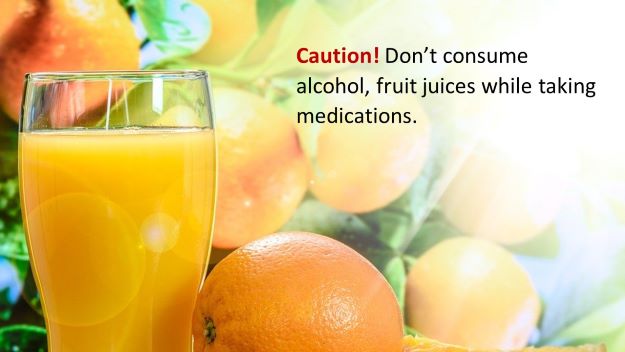Firstly because many drugs inherently interact with alcohol and/ or fruit juices (including natural juices). In technical terms this is called as drug-food interaction. What this means is that, the drug’s behavior on a patient’s body changes and it may not show the desired beneficial effect or cure. This is called In other cases, it may also show single or multiple adverse effects including vomiting, head ache, flushing, paralysis or even death.
Secondly, if a patient takes multiple medications (including vitamins and supplements), consuming alcohol or fruit juice along with medications can lead to potential drug-drug interactions inside a patient’s body. This can aggravate effect of one drug while minimizing effect of other drugs, producing toxic effects of one drug while the other drugs show no effect at all !
Thirdly, if a patient takes a ‘Time Release” medication, consuming alcohol along with such medications might prove to be fatal.
A time-release medicament is a hi-tech product. It typically contains 2 or more doses of the drug (or medicament) in a single tablet or capsule, which is programmed to automatically release appropriate drug doses at programmed time intervals. Alcohol damages this programming and the patient gets all doses in one go, scientifically referred to as ‘dose dumping’. And the adversity of toxic effects as a result of dose-dumping, will directly be dependent upon the extent of dose-dumping and may include headache, vomiting, skin rashes, difficulty in breathing, loss of vision, memory loss, paralysis and death. Since, each person’s body reacts differently to alcohol initiated dose-dumping, it is absolutely impractical to predict severity of adverse effects.
Synonymous time-release formulations include- Extended release (ER), Modified release (MR), Controlled release (CR), Sustained release (SR), Prolonged release (PR), Delayed release (DR) etc.
Time-release medications are available both as Prescription (for example Sedatives, Marijuana, Antidepressants, Opiates, Anti-diabetic, Anti-blood pressure, Antibiotics etc.) as well as Over- the-counter (OTC) products (such as Cold, Flu, Anti-allergy, Aspirin, Pain remedies etc).
Regardless of the medicament being regular or a time-release product, if you take prescription or over-the-counter medications, ask your health care provider for advice about alcohol, fruit juice intake. An important point to note is that even herbal medicines and supplements can have adverse interactions with alcohol and/or fruit juices.
Such information about a particular drug product's potential interaction with alcohol, fruit juices, or any other hot or cold beverage can be displayed on the pharma manufacturing company's website. This is an un-met opportunity in Continuous Improvement of patient engagement process.
Disclaimer- Readers are advised to please note that, the information contained in this article is NOT a substitute for medical advice. It is intended to empower general public to understand the pharmaceutical world and consider ideas and alternatives while discussing their specific health scenario with medical and pharmaceutical professionals. Please discuss your specific scenario with a qualified Medical Doctor and ONLY follow health advice given by a qualified medical professional. Also, please note that each country has its own health care related regulation(s), readers are therefore expected to over-ride any information presented here to adhere to rules of their land.





















